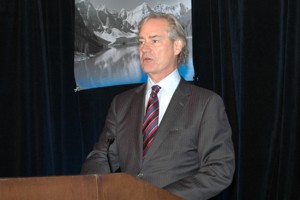Maple Leaf's McCain sees clear path for future of Canadian hog industry
Date posted: January 14, 2016

Michael McCain
Michael McCain, president and CEO of Maple Leaf Foods, kicked off the 2016 Banff Pork Seminar with a strong message for the industry. "I am very confident about our future as a sustainable, profitable industry but this will require embracing the social and environmental factors I am discussing here today."
Those three areas of focus and opportunity going forward are health and nutrition, animal welfare and environmental sustainability.
Health and nutrition
When the World Health Organization's (WHO) International Agency for Research on Cancer released its report last year stating red meat and processed meats were closely linked to colorectal cancer, the media took over and the story exploded. "We need to do a better job of getting balanced information out so people can make informed choices," says McCain.
He drew a comparison to what happened with gluten in wheat and the huge decline in bread consumption in recent years. One thing to be learned from the escalation of gluten from a nutritious protein to a culprit, is how quickly a minor or negligible risk can turn overnight into a food movement. "The vilification of gluten could easily happen to red meat," he says.
McCain stated repeatedly during his presentation, the importance of communicating about the industry, its practices, commitments and opportunities. Through their Canadian and U.S. industry associations, Maple Leaf is building a fund that will support a more robust effort to counter misinformation and reinforce the benefits of meat.
"We know people want more transparency regarding how food is raised and processed," says McCain. He cited a recent study that found 60 percent of the respondents said that antibiotics and hormones used in pork and livestock production are a health concern, and that 34 per cent of the people believed pork and poultry are less safe today then when they were children.
Changes are being made in the industry. Producers continue to adopt animal husbandry practices that reduce their reliance on antibiotics. Food processors are reducing their use of sodium, sweeteners and artificial flavours and are migrating toward simpler and more natural ingredients.
Animal welfare
Over 10 years ago the Canadian Pork Council launched its animal care assessment, the ACA certification program based on the work of the National Farm Animal Care Council. While it is a voluntary program, Maple Leaf Foods now only contracts with producers who adhere to the ACA standards.
But standards such as these are not always enough. "We are only as good as our weakest link," says McCain. "The rise of undercover videos...shows a gap in the duty of care to treat animals ethically and humanely."
Most retail and food service organizations identify animal welfare as their number one concern in meeting societal expectations and within this, conversion from gestation crates to loose housing is their top priority - one in which McCain feels Canadian producers are lagging behind.
Maple Leaf has taken major strides in improving animal welfare practices within their organization including: conversion of the sows under their management to loose housing; audits of all of their pork operations annually; alternatives to pain management and surgical procedures as well as improved animal husbandry to reduce or eliminate the need for antibiotic treatment; and remote or video auditing in processing facilities and in the future hog operations.

Media Interviews
"Blaming activists or reverting to a defensive posture will not solve this challenge. This is not a fleeting issue and defending the status quo is not a viable option," says McCain. "As an industry we need to rally together to advance higher standards and higher expectations of each other."
In a final statement on the importance of animal welfare to the Canadian pork industry, McCain referenced Smithfield, the world's largest pork producer. They have committed to group housing on company farms by 2017 and by 2022 for all of its contract producers. As a sector that relies on the export market, Canada will need to raise its bar to compete internationally.
Environmental sustainability
"One of the greatest challenges of the agriculture industry us to meet the increasing global demand for food while dramatically decreasing its environmental footprint of food production," says McCain.
It has often been said that no single activity has as great an impact on the planet than the raising of livestock. Feeding the world accounts for approximately 25 to 30 percent of total greenhouse gas emissions of which meat and dairy production counts for up to as much as 18 percent.
Canada recently signed the global agreement to set a goal limiting global warming to less than 2 C compared to pre-industrial levels. "Achieving this goal will have profound implications for us and our collective future and it is incumbent on our industry to do as much as we can to reduce our environmental footprint," says McCain.
Maple Leaf has committed as a company to reduce their environmental footprint by 50 percent by 2025 – and McCain noted that many of the efficiencies they are making have also had a positive impact on the bottom line of the organization.
State of the industry
The Canadian pork sector is a multibillion-dollar industry that exports to over 100 countries, contributes 10 percent of all farm cash receipts and provides a living for tens of thousands of people. McCain sees both challenges and opportunities ahead for the Canadian pork industry.
The cost of producing pork in Canada is higher than in the United States due to labour, construction and utility costs, and greater regulatory and transportation costs. Additionally, the infrastructure is aging - more barns were built in Minnesota and Iowa in one year, than in Western Canada in the last many years.
But there is good news too. The increasingly lower dollar gives Canadian exports an advantage over the United States. The disuse of ractopamine has opened new markets. Canada's natural environment and improved animal husbandry is reducing the need for antibiotics. And the Canadian brand is becoming a sought after proof point on menus domestically.
Finally, when discussing small farms versus scale agriculture, McCain has this to say, "I see misinformation every day. The enemy of sustainability is big food, big farming, scale agriculture and the path to the Promised Land is local food. When in reality we know that factually it is the reverse. The facts that support that well operated, well regulated, technologically advanced, scale agriculture and livestock, particularly in pork and poultry, is our friend not our enemy."
Return to the News Release Index
